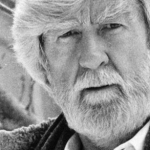Sometimes it’s the shoes, the tying and untying,
the bending of the heart to put them on,
take them off, the rush of blood
between the head and feet, my face,
sometimes, if I could see it, astonished.
Other times the stairs, three, four stages
at the most, “flights” we call them,
in honor of the wings we’ll never have,
the fifth floor the one that kills the breath,
where the bird in the building flies to first.
Love, too, a leveler, a dying all its own,
the parts left behind not to be replaced,
a loss ongoing, and every day increased,
like rising in the night, at 3:00 am,
to watch the snow or the dead leaf fall,
the rings around the streetlight in the rain,
and then the rain, the red fist in the heart
opening and closing almost without me.
“ — Yesterday brought to today so lightly!”
The morning, more and more, like evening.
When I bend to tie my shoes and the blood
fills the cup, it’s as if I see into the hidden earth,
see the sunburned path on which I pass
in shoes that look like sandals
and arrive at a house where my feet
are washed and wiped with my mother’s hair
and anointed with the autumn oils of wildflowers.

















Comment form: